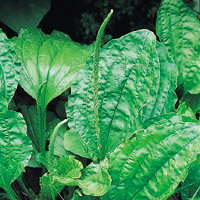Penn Herb Wellness Guide
PlantainFind Products
 © Martin Wall
© Martin WallHow It Works
The major constituents in plantain are mucilage, iridoid glycosides (particularly aucubin), and tannins. Together these constituents are thought to give plantain mild anti-inflammatory, antimicrobial, antihemorrhagic, and expectorant actions.3, 4 Plantain is approved by the German Commission E for internal use to ease coughs and mucous membrane irritation associated with upper respiratory tract infections as well as topical use for skin inflammations.5 Two Bulgarian clinical trials have suggested that plantain may be effective in the treatment of chronic bronchitis.6, 7 Insufficient details were provided in these reports to determine the quality of the trials or their findings. Although plantain was thought to possess diuretic properties, one double-blind trial failed to show any diuretic effect for this plant.8 A preliminary trial found that topical use of a plantain ointment (10% ground plantain in a base of petroleum jelly) was helpful as part of the treatment of people with impetigo and ecthyma, two inflammatory skin disorders.9 Insufficient details were provided in this report, however, to determine the quality of the study or its findings.
How to Use It
The German Commission E recommends using 1/41/2 teaspoon (13 grams) of the leaf daily in the form of tea made by steeping the herb in 1 cup (250 ml) of hot water for 1015 minutes (making three cups (750 ml ) per day).10 The fresh leaves can be applied directly three or four times per day to minor injuries, dermatitis, and insect stings.11 Syrups or tinctures, approximately 1/2 teaspoon (23 ml) three times per day, can also be used, particularly to treat a cough.12 Finally, 1/21 1/4 teaspoons (26 grams) of the fresh plant can be juiced and taken in three evenly divided oral administrations throughout the day.13
Copyright 2025 TraceGains, Inc. All rights reserved.
Learn more about TraceGains, the company.
The information presented by TraceGains is for informational purposes only. It is based on scientific studies (human, animal, or in vitro), clinical experience, or traditional usage as cited in each article. The results reported may not necessarily occur in all individuals. Self-treatment is not recommended for life-threatening conditions that require medical treatment under a doctor's care. For many of the conditions discussed, treatment with prescription or over the counter medication is also available. Consult your doctor, practitioner, and/or pharmacist for any health problem and before using any supplements or before making any changes in prescribed medications. Information expires December 2025.


